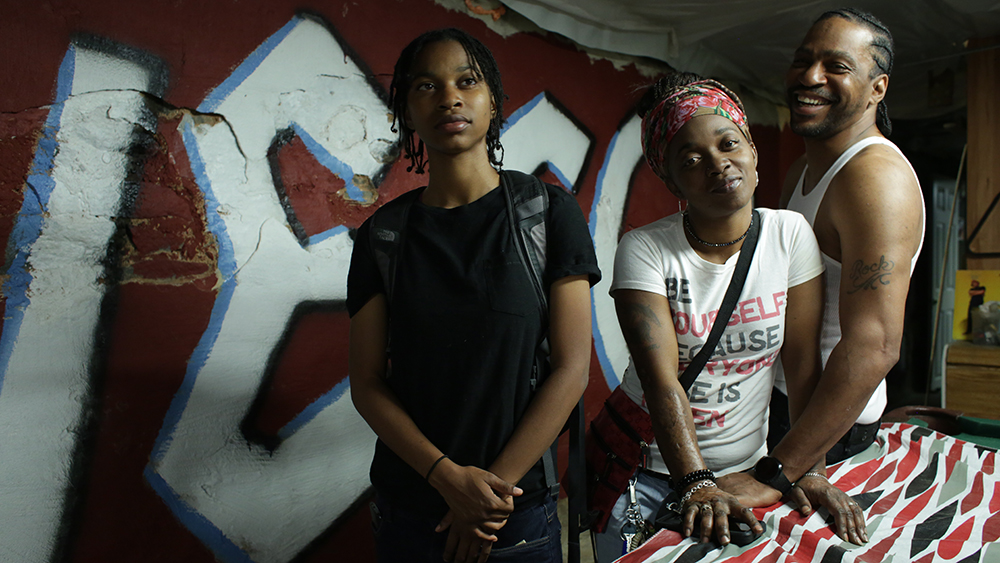Celebrating its 46th edition in this year, the New Directors/New Films festival introduces New York City audiences to the work of emerging filmmakers from around the world. Throughout its rich, nearly half-century history, New Directors has brought previously little-known talents like Spike Lee, Pedro Almódovar, Chantal Akerman, Hou Hsiao-hsien, Laura Poitras, Christopher Nolan, and Kelly Reichardt to wider audiences.
The 2017 ND/NF film slate is once again rich with the next generation of filmmakers and their stars and subjects. With multiple films featuring or made by people of color, among them is an unexpectedly rich documentary chronicling close to ten years in the life of an African-American family living Philadelphia, from the dawn of the Obama presidency to the present day.
Quest is a group portrait of the Rainey family: patriarch Christopher aka “Quest,” whose passion to keep open his music studio as an outlet for self-determination, sanctuary, and healing in his community is juxtaposed by the odd jobs he has to take to support his own family, matriarch Chirstine’a, known affectionately as Ma, who supports Quest in his journey while working tirelessly at a local homeless shelter and trying to take care of both her son William, who is undergoing brain cancer treatment while trying to raise his newborn son, and the endearing PJ, Christopher and Chirstine’a’s independently-minded daughter.
While the family seems somewhat typical on the outside, especially for their North Philadelphia neighborhood, what makes their story standout is their love and understanding for one another, a love not often depicted in “urban” focus documentaries. Just as important however is director Jonathan Olshefski’s constant, vérité gaze of respect and admiration, but still a critical outside look, of the Raineys.

The pacing of Quest is what works best for it. The film takes its time to allow you to feel the triumphs and the mundanity of the Rainey’s lives. And even when it goes down what may be seen as a typical “ghetto narrative” (a literal tearjerker of a moment), it is the actual world and their circumstances telling the story, not the filmmakers own. Most of all, the Raineys stand out because they do not define themselves by their circumstances, they define themselves by how they circumvent them and stay together as a unit. And that unit is not independent of their community, it’s stronger because of it.
Still, I almost did not go see this film. Though I possess a critical eye no matter the subject, I am wary of white directors and their oftentimes troubling gaze into the inner workings of the Black community. But Quest is not that at all, Olshefski’s intimate perspective is genuine, and he notes his outsider status as an artist who began photographing the Rainey’s studio simply to share their hopeful community message for North Philly, but felt he had to do more to share the story of these incredible individuals and family.
Olshefski notes that, “Over the years I have often been asked, “What right do you have, as a white man, to make a film about a Black community?” I don’t know if I am the one to answer that question. I made the film and I stand by my choices, but I don’t think I have any inherent right and I am very aware of the long history of privileged filmmakers going into communities that are not their own to take stories and craft them for other audiences outside of the community. This can be an incredibly destructive process and marginalize the place and its people, especially when it is a place that was already marginalized.”
No doubt that some of his perspective may have been shaped by his award winning producer, the versatile Sabrina Schmidt Gordon. Most recently known as director of the documentary BaddDDD Sonia Sanchez, her prior claims to fame are as co-producer and editor of DOCUMENTED, about undocumented journalist Jose Antonio Vargas, and Hip-Hop: Beyond Beats and Rhymes, directed by Byron Hurt and which premiered at the 2006 Sundance Film Festival.
QUEST (105 min.) makes its New York premiere on March 18th and 19th at New Directors/New Films. For tickets and more info, go to the New Directors/New Films website.
New Directors/New Films runs from March 15-26 and is is presented by The Museum of Modern Art and the Film Society of Lincoln Center. Also showing are the below films, which include Yance Ford’s Strong Island, which we featured in January in our Sundance Film Festival 2017 preview. See more about Quest on the film’s website.

Yance Ford, USA/Denmark, 2017, 107m
New York Premiere
A haunting investigation into the murder of a young black man in 1992, Yance Ford’s Strong Island is achingly personal—the victim, 24-year-old William Ford Jr., was the filmmaker’s brother. Ford powerfully renders the specter of his brother’s death and its devastating effect on his family, and uses the tools of cinema to carefully examine the injustice perpetrated when the killer, a 19-year-old white man, was not indicted by an all-white jury. As a work of memoir and true crime, Strong Island tells one of the most remarkable stories in recent documentary; as a political artwork, its resonance is profound.

John Trengove
South Africa/Germany/Netherlands/France, 2017, 88m
Xhosa with English subtitles
New York Premiere
In a mountainous corner of the Eastern Cape of South Africa, an age-old Xhosa ritual introducing adolescent boys to manhood continues to this day. This is the backdrop for this stark and stirring first feature by John Trengove, in which Xolani, a quiet and sensitive factory worker (played by musician Nakhane Touré), guides one of the boys, Kwanda, an urban transplant sent against his will from Johannesburg to be toughened up, through this rite of passage. In an environment where machismo rules, Kwanda negotiates his own identity while discovering the secret of Xolani’s sexuality. Brimming with fear and violence, The Wound is an exploration of tradition and masculinity. A Kino Lorber release.

Daouda Coulibaly
France/Mali/Senegal, 2016, 95m
Bambara and French with English subtitles
New York Premiere
A gangster picture with political resonance, Wùlu tracks the rise to power of Ladji, a 20-year-old van driver in Mali who takes to crime so that his older sister can quit a life of prostitution. He calls in a favor from a drug-dealer friend and soon finds himself deeply involved in a complex and illicit enterprise; as he discovers his knack for his new profession and his lifestyle ostensibly improves, the stakes grow higher and deadlier by the day. Set during the lead-up to 2012’s Malian Civil War, Wùlu is more than an exciting and superbly made thriller—it offers a powerful glimpse at the complexities of a particular historical moment.

Sanal Kumar Sasidharan
India, 2017, 85m
Malayalam with English subtitles
North American Premiere
Sasidharan’s third feature, main competition winner at this year’s International Rotterdam Film Festival, is a wildly tense nocturnal thriller with a razor-sharp political message. Late one night, Kabeer and Durga, a young couple on the run, are picked up by two strange men in a minivan who offer them a lift to a nearby train station. However, these men reveal themselves to be anything but benevolent, and so begins a long, claustrophobic drive that feels like Funny Games meets The Exterminating Angel. Sasidharan renders this bad trip with precision and an economy of style.

